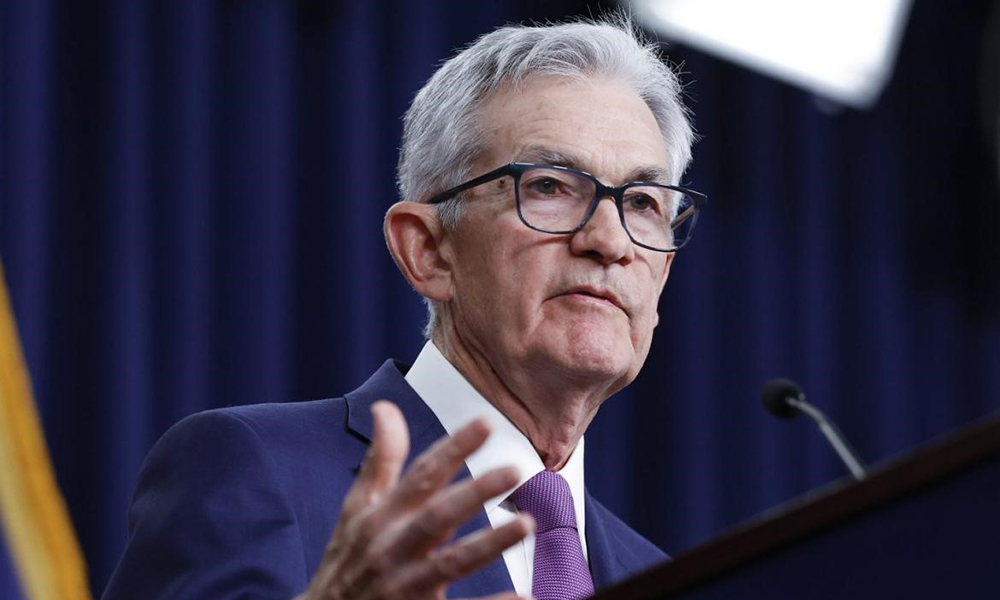
随着美国国债总额达到34.2万亿美元,一些全球最有影响力的金融界人物纷纷站出来发表自己的观点。但很少会有人预料到,美联储主席杰罗姆·鲍威尔会就这个问题发声。鲍威尔周日在CBS的《60分钟》栏目中谈到了美国的联邦负债。鲍威尔警告:“从长远来看,美国的财务路线难以为继。”
虽然美国在2023年避开了普遍预测会发生的经济衰退,但创纪录的政府支出和税收收入减少,导致美国的国债创历史新高。这种趋势延续到了今年。美国政府负债与GDP的比率(衡量总公共负债与经济增长比率的指标)从2019年的略高于100%,提高到超过120%。虽然这比疫情期间的最高点133%有所下降,但正如鲍威尔所说,美国政府负债的“增长速度依旧快于经济增长速度”。
鲍威尔表示,这意味着现在“是时候让当选的政府官员们开展成熟理性的对话,让联邦政府恢复可持续的财政路线。”
“寅吃卯粮”
美联储官员谈论政治的情况较为罕见。毕竟,美联储应该是一个无党派的独立机构。鲍威尔周末在《60分钟》栏目中重申:“我们尽量不对财政政策发表意见,也不会指示国会如何做好他们的工作,实际上他们对我们具有监督权。”
但鲍威尔马上就批评国会议员“不可持续的”政策“实际上是在寅吃卯粮”。他说道:“是时候重新将财政可持续性放在第一位了。”
除了美联储主席鲍威尔,还有许多人批评政府的财政政策和大幅增多的国家负债,其中包括摩根大通(JPMorgan Chase)CEO杰米·戴蒙。戴蒙上个月曾警告,如果对联邦政府过重的债务负担无所作为,美国经济将坠落“悬崖”。
他在两党政策中心(Bipartisan Policy Center)的一次专题讨论会上说道:“我们看到了前方的悬崖,距离坠入悬崖大约有10年的时间。我们正在以每小时60英里的速度[朝着它]前行。”戴蒙认为,美国的国会议员们需要修改当前的支出路线,并控制国家负债,否则将会出现美国政府债券的外国持有人“叛逃”的情况。
其他华尔街的重量级人物多年来一直批评不断扩大的联邦财政赤字。私募对冲基金环宇投资公司(Universa Investments)的创始人兼首席投资官马克·斯皮兹纳格尔去年对《财富》杂志表示,我们正在经历“人类历史上最大规模的信用泡沫”。
他说道:“这不是我的个人观点,数据证明了这一点。毫无疑问,我们生活在杠杆化的时代和信贷的时代,而这将会带来后果。”
对冲基金巨头桥水联合基金的创始人雷·达利奥也一直在警告可能出现的问题。他在12月表示,美国政府的债务问题正在达到一个“拐点”。达利奥警告,最终,美国政府将不得不依靠借款偿还年度债务,而这将会引发债务危机。
有好消息吗?
有好消息吗?正如鲍威尔近期所说的那样,美国“经济相比其他国家,依旧更有活力、创新力、灵活性和适应性。”鲍威尔认为,这是美国经济过去几年表现优于其他国家的“主要原因”,但除此之外,还有其他许多原因。美国富有活力的经济意味着债务状况还没有到无法补救的地步。但正如鲍威尔所说:“更快行动比较晚行动更好。”
虽然遭到了批评,但美国财政部长珍妮特·耶伦却对国债增多的担忧不屑一顾。耶伦关注的关键指标是净利息支付占GDP的比例。她在去年9月接受CNBC采访时曾表示,该比例依旧“处于非常合理的水平”。(财富中文网)
翻译:刘进龙
审校:汪皓
随着美国国债总额达到34.2万亿美元,一些全球最有影响力的金融界人物纷纷站出来发表自己的观点。但很少会有人预料到,美联储主席杰罗姆·鲍威尔会就这个问题发声。鲍威尔周日在CBS的《60分钟》栏目中谈到了美国的联邦负债。鲍威尔警告:“从长远来看,美国的财务路线难以为继。”
虽然美国在2023年避开了普遍预测会发生的经济衰退,但创纪录的政府支出和税收收入减少,导致美国的国债创历史新高。这种趋势延续到了今年。美国政府负债与GDP的比率(衡量总公共负债与经济增长比率的指标)从2019年的略高于100%,提高到超过120%。虽然这比疫情期间的最高点133%有所下降,但正如鲍威尔所说,美国政府负债的“增长速度依旧快于经济增长速度”。
鲍威尔表示,这意味着现在“是时候让当选的政府官员们开展成熟理性的对话,让联邦政府恢复可持续的财政路线。”
“寅吃卯粮”
美联储官员谈论政治的情况较为罕见。毕竟,美联储应该是一个无党派的独立机构。鲍威尔周末在《60分钟》栏目中重申:“我们尽量不对财政政策发表意见,也不会指示国会如何做好他们的工作,实际上他们对我们具有监督权。”
但鲍威尔马上就批评国会议员“不可持续的”政策“实际上是在寅吃卯粮”。他说道:“是时候重新将财政可持续性放在第一位了。”
除了美联储主席鲍威尔,还有许多人批评政府的财政政策和大幅增多的国家负债,其中包括摩根大通(JPMorgan Chase)CEO杰米·戴蒙。戴蒙上个月曾警告,如果对联邦政府过重的债务负担无所作为,美国经济将坠落“悬崖”。
他在两党政策中心(Bipartisan Policy Center)的一次专题讨论会上说道:“我们看到了前方的悬崖,距离坠入悬崖大约有10年的时间。我们正在以每小时60英里的速度[朝着它]前行。”戴蒙认为,美国的国会议员们需要修改当前的支出路线,并控制国家负债,否则将会出现美国政府债券的外国持有人“叛逃”的情况。
其他华尔街的重量级人物多年来一直批评不断扩大的联邦财政赤字。私募对冲基金环宇投资公司(Universa Investments)的创始人兼首席投资官马克·斯皮兹纳格尔去年对《财富》杂志表示,我们正在经历“人类历史上最大规模的信用泡沫”。
他说道:“这不是我的个人观点,数据证明了这一点。毫无疑问,我们生活在杠杆化的时代和信贷的时代,而这将会带来后果。”
对冲基金巨头桥水联合基金的创始人雷·达利奥也一直在警告可能出现的问题。他在12月表示,美国政府的债务问题正在达到一个“拐点”。达利奥警告,最终,美国政府将不得不依靠借款偿还年度债务,而这将会引发债务危机。
有好消息吗?
有好消息吗?正如鲍威尔近期所说的那样,美国“经济相比其他国家,依旧更有活力、创新力、灵活性和适应性。”鲍威尔认为,这是美国经济过去几年表现优于其他国家的“主要原因”,但除此之外,还有其他许多原因。美国富有活力的经济意味着债务状况还没有到无法补救的地步。但正如鲍威尔所说:“更快行动比较晚行动更好。”
虽然遭到了批评,但美国财政部长珍妮特·耶伦却对国债增多的担忧不屑一顾。耶伦关注的关键指标是净利息支付占GDP的比例。她在去年9月接受CNBC采访时曾表示,该比例依旧“处于非常合理的水平”。(财富中文网)
翻译:刘进龙
审校:汪皓
With the United States’ national debt closing in on $34.2 trillion, some of the biggest figures in the world of finance have been speaking out. But few expected Federal Reserve Chairman Jerome Powell to address the issue—at least until this weekend, when Powell spoke out about the debt on CBS’s 60 Minutes Sunday. “In the long run, the U.S. is on an unsustainable fiscal path,” Powell warned.
Even as the U.S. economy avoided a widely forecast recession in 2023, record government spending and lower tax receipts led the national debt to surge to an all-time high. And that trend has continued into this year. The U.S. government debt to GDP ratio, a measure of total public debt to economic growth, has surged from just over 100% in 2019 to over 120%. That’s down from the COVID-era peak of 133%, but, as Powell put it, the government’s debt is still “growing faster than the economy.”
This means it’s now “past time, to get back to an adult conversation among elected officials about getting the federal government back on a sustainable fiscal path,” Powell argued Sunday.
‘Borrowing from future generations’
It’s rare to see a Fed official discuss politics. The U.S. central bank is supposed to be a nonpartisan, independent institution, after all. Powell reiterated as much in his 60 Minutes interview over the weekend, saying, “We mostly try very hard not to comment on fiscal policy and instruct Congress on how to do their job, when actually they have oversight over us.”
But almost immediately after that statement, Powell criticized lawmakers for “effectively borrowing from future generations” with their “unsustainable” policies. “It’s time for us to get back to putting a priority on fiscal sustainability,” he added.
Fed Chair Powell joins a number of critics of fiscal policy and the surging national debt, including JPMorgan Chase CEO Jamie Dimon. Dimon, warned last month that the U.S. economy is headed for a “cliff” if something isn’t done to address the federal government’s excessive debt burden.
“We see the cliff. It’s about 10 years out. We’re going 60 miles an hour [toward it],” he said at a Bipartisan Policy Center panel. Dimon argued that U.S. lawmakers will need to alter the current path of spending and control the national debt or there could be “rebellion” among foreign owners of U.S. government bonds.
Other Wall Street heavyweights have been criticizing rising federal deficits for years. Mark Spitznagel, founder and chief investment officer of private hedge fund Universa Investments, told Fortune last year that we are living through “the greatest credit bubble in human history.”
“And that’s not my opinion, that’s just numbers,” he said. “There is no question about the fact that we are living in an age of leverage, an age of credit, and it will have its consequences.”
Ray Dalio, founder of hedge fund giant Bridgewater Associates, has also been warning of brewing issues. In December, he argued that the U.S. government is reaching an “inflection point” with its debt problem. Eventually, the government will have to borrow just to make its annual debt servicing payments, and that’s a recipe for a debt crisis, Dalio warned.
Some good news?
The good news? As Powell described Sunday, the U.S. still has a “dynamic, innovative, flexible, adaptable economy, more so than other countries.” Powell argued that this is the “big reason” why the U.S. economy has outperformed its peers over the past few years—but there are a few others, as Fortune detailed last week. America’s dynamic economy means the debt situation isn’t too far gone to rectify just yet. But as Powell said: “Sooner is better than later.”
Despite the criticism, Treasury Secretary Janet Yellen has brushed off concerns about the rising national debt. The key metric Yellen looks at is net interest payments as a share of GDP, and that is still “at a very reasonable level,” she argued in a CNBC interview last September.






